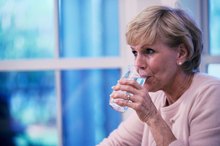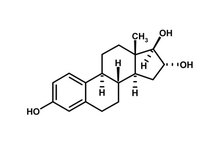Why Drinking Water With a Meal Causes Weight Gain
One cannot justifiably say that drinking water with meals makes you fat. Water has zero calories. There is a bigger picture. Over time, improper combinations of foods and drinks can have an effect on your body's responses to weight loss because of the effect it has on detoxification. When you consider the body's detoxification pathways -- the liver, the digestive system, the kidneys, the lymphatic system and the skin -- the best time for water consumption is between meals to help flush the system.
Dilution of Digestive Enzymes
Many people drink water with their meals. According to "Detox" author Sara Rose, this dilutes the digestive enzymes that are secreted to break down food particles in the stomach. The stomach will tend to bloat when unable to digest food properly, and undigested foods will not be properly absorbed. It is important that you absorb as many nutrients as you can from your food to stay healthy. Taking small sips when needed is fine as long as it does not take the place of chewing your food well, the lack of which can also hinder digestion and cause the digestive organs to work harder.
- Many people drink water with their meals.
- Taking small sips when needed is fine as long as it does not take the place of chewing your food well, the lack of which can also hinder digestion and cause the digestive organs to work harder.
The "Fat" Might Just Be Fluid
Digestive Juices & Enzymes
Learn More
Inadequate fluid consumption leads to bloating and fluid retention, which can make you appear fatter than you are. Rose says we need to drink at least eight glasses of water throughout the day to help avoid fluid retention and keep your body's waste disposal system functioning. If you only drink during meals, regular detoxification of the liver is not at its best. With a toxic liver, the body does not metabolize fat very well, and over time, liver damage increases, making fat gain more likely.
- Inadequate fluid consumption leads to bloating and fluid retention, which can make you appear fatter than you are.
When to Drink Water
To see weight loss results, the focus should be more about drinking at times other than with your meal. Dr. Elson Haas advises us to drink two to three glasses of water before each meal and at night to help flush toxins during the body's natural elimination time. This will also help fill your belly so you will not overeat, increasing the rate of fat loss.
Controversial Issues
How to Stop Hunger Pains Without Eating
Learn More
Many health authorities say drinking during meals does not dilute digestive enzymes any more than naturally occurs with liquid and that it's only to a small degree. This also depends on the amount of water consumed. There are all kinds of blogs and articles related to fat gain from drinking with food, but these don't include the connections between food combining, detoxification and reduced liver function from constant abuse.
Test It Yourself
Try incorporating two to three glasses of water between meals; Drink two first thing in the morning. A half hour later, eat breakfast (this can include a smoothie, but no coffee or tea). About 30 to 60 minutes before lunch, drink another two or three glasses of water. Do the same before dinner. Before bed, drink another glass of water. You will see and feel a difference in your waistline and in how much less you need to eat; snack cravings may even diminish.
- Try incorporating two to three glasses of water between meals; Drink two first thing in the morning.
Considerations
The tendency to drink with food may come from having too many cooked or processed foods that lack enzymes and water content. Salads, fruits, smoothies, crudites and even soups, although cooked, are easy to digest and all good for keeping you from guzzling that bottle of water. Be sure to consume several high-water-content foods throughout the day either for snacks or as part of your meal.
Related Articles
References
- "Staying Healthy With Nutrition"; Elson Haas; 2006
- "Detox"; Sara Rose; 2004
- Acefitness.org, Fit Facts, Healthy Hydration, 2008
- CDC.gov, Water and nutrition basics, 6/3/14
- US National Library of Medicine, National Institutes of Health, Effect of ‘Water Induced Thermogenesis’ on Body Weight, Body Mass Index and Body Composition of Overweight Subjects, Journal Clinical. Diagnostic Res., 9/10/13, A. Vij and Anjali S. Joshi
- Ohashi Y, Sakai K, Hase H, Joki N. Dry weight targeting: The art and science of conventional hemodialysis. Semin Dial. 2018;31(6):551-556. doi:10.1111/sdi.12721
- Beverages, water, tap, drinking. FoodData Central. U.S. Department of Agriculture. Published April 1, 2019.
- Dietary reference intakes for water, potassium, sodium, chloride, and sulfate. National Academies Press, 2005.
- Jéquier E, Constant F. Water as an essential nutrient: The physiological basis of hydration. Eur J Clin Nutr. 2010;64(2):115-23. doi:10.1038/ejcn.2009.111
- Popkin BM, D'Anci KE, Rosenberg IH. Water, hydration, and health. Nutr Rev. 2010;68(8):439-4358. doi:10.1111/j.1753-4887.2010.00304.x
- Adan A. Cognitive performance and dehydration. J Am Coll Nutr. 2012;31(2):71-8. doi:10.1080/07315724.2012.10720011
- Dennis EA, Dengo AL, Comber DL, et al. Water consumption increases weight loss during a hypocaloric diet intervention in middle-aged and older adults. Obesity (Silver Spring). 2010;18(2):300-307. doi:10.1038/oby.2009.235
- National Institutes of Health Genetic and Rare Diseases Information Center. Aquagenic urticaria. Updated June 20, 2016.
- Centers for Disease Control and Prevention. Well testing. Updated April 10, 2009.
Writer Bio
Charlene Ryan began freelance writing in 2011. She is a certified fitness trainer and natural health consultant who works at her local YMCA. Ryan earned a Bachelor of Science in holistic nutrition from the Clayton College of Natural Health.









